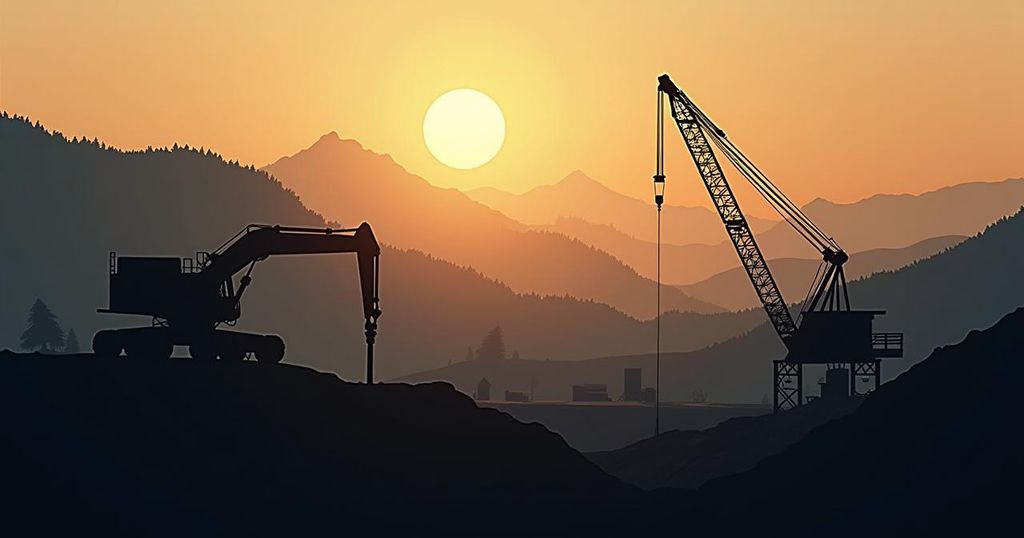UN Report Exposes Revenue Streams of M23 Rebel Group in Congo’s Mining Regions
The M23 rebel group in eastern Congo is reportedly generating $300,000 each month from control over the Rubaya mining area, which is rich in tantalum, a crucial mineral. The ongoing conflict has resulted in significant humanitarian issues, with over six million people displaced due to violence from multiple armed groups. The Republic of Congo has accused Rwanda of intervening in its affairs through military support to the M23 faction, leading to international scrutiny and the potential for sanctions.
According to the United Nations Security Council, an armed rebel group in Congo, known as M23, generates an estimated $300,000 per month from its control over a mining region situated in the eastern part of the country. This revelation was made during a recent meeting, where Bintou Keita, the head of the U.N. mission in Congo, informed the Council that the M23 captured the Rubaya mining area in April, an area rich in tantalum, a vital mineral utilized in the production of smartphones and computers. The Rubaya site accounts for over 15% of the global supply of tantalum, extracted from coltan. In her statement, Keita emphasized the dire necessity for international sanctions against individuals profiting from this illicit trade, asserting that without such measures, peace would remain unattainable, putting civilian lives at further risk. Earlier this year, the Congolese government raised concerns regarding Apple’s involvement with “blood minerals” being smuggled into its supply chain. The prolonged conflict in eastern Congo, often regarded as one of the world’s most severe humanitarian crises, has led to the emergence of over 120 armed groups competing for power, land, and access to valuable mineral resources. This violence has resulted in displacements affecting approximately six million individuals. M23, or the March 23 Movement, primarily consists of ethnic Tutsis who separated from the Congolese army more than a decade ago. The group previously launched a significant offensive in 2012, during which they took control of the provincial capital, Goma, located near the Rwandan border, a city they now threaten to capture once more. Rwanda has been accused by the Congolese government of committing war crimes in the region, and both U.S. and U.N. experts claim that Rwanda has provided military support to M23. Although Rwanda has denied these allegations, in February, they acknowledged the presence of their troops and missile systems in eastern Congo to protect their national security, citing the buildup of Congolese forces near the border. Recent U.N. reports indicate that there may be between 3,000 and 4,000 Rwandan military personnel active in eastern Congo alongside M23 rebels, who have been making significant territorial gains recently. A regional court in East Africa has commenced proceedings in a case brought forth by Congo against Rwanda, reflecting concerns regarding violations of Congolese sovereignty due to the presence of foreign troops aiding local rebels.
The situation in eastern Congo is deeply rooted in decades of conflict, characterized by a struggle amongst various armed groups seeking control over land and resources. The M23 rebel group has longstanding ties to ethnic conflicts in the region, particularly involving the Tutsi population and its relationship with Rwanda. The ongoing fighting has created significant humanitarian distress, including mass displacements and severe human rights violations. The control of lucrative mineral resources, such as tantalum, continues to fuel the conflict and complicate peace efforts, drawing international attention and intervention.
The M23 rebel group’s substantial monthly income from the seized mining area underscores the ongoing exploitation of Congo’s mineral wealth amidst a protracted conflict. The involvement of external forces, particularly from Rwanda, further complicates the situation and exacerbates the humanitarian crisis. The call for international sanctions highlights the urgent need for global awareness and action to address these criminal activities and restore peace and stability in the region.
Original Source: apnews.com




Post Comment